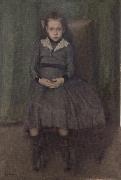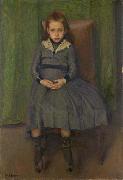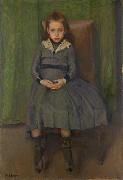Wholesale Oil Painting Reproductions No Minimum and Door to Door! |
|||||||||||
|
|
|||||||||||

|
|||||||||||
|
|
|
||||||||
All Hugh Ramsay Oil Paintings |
||||||||
|
|
||||||||
|
|
||||||||
|
Artist Introduction: Australian portrait painter ,
1877 - 1906
was an Australian artist. Ramsay was born in Glasgow, Scotland, son of John Ramsay. He moved with his family to Melbourne in 1878. He was educated at Essendon Grammar School, and joined classes at the National Gallery of Victoria at age 16 under Lindsay Bernard Hall and became one of the most brilliant students ever trained there. He won several first prizes, and at the competition for the travelling scholarship held in 1899 was narrowly beaten by Max Meldrum, another student of unusual ability. Ramsay went to Europe in September 1900 and was fortunate in finding a kindred spirit, George Washington Lambert, on the same vessel. Arriving at Paris he entered Acad??mie Colarossi and was soon recognized as a student of great potential. He sent five pictures to the 1902 exhibition of La Soci??t?? Nationale des Beaux Arts and four of these were accepted and hung together. No greater compliment could have been paid to a young student. Another Australian student whose studio was in the same building, Ambrose McCarthy Patterson (nephew of Nellie Melba, then at the height of her fame). Ramsay was introduced to Melba, who gave him a commission for a portrait and would no doubt have been able to help him in his career. Unfortunately Ramsay became ill in Paris, and it became necessary for him to return to the warmer climate of Australia and the opportunity to paint Melba was missed. Before leaving Europe he had exhibited four pictures at the British Colonial Art Exhibition held in London at the Royal Institute galleries. Returning to Australia, in spite of failing health, Ramsay succeeded in doing some remarkable work including "The Sisters" now in the Sydney gallery, the "Lady with a Fan" (possibly his most famous painting), the portrait of David Scott Mitchell, and his own portrait now in the Melbourne gallery. He gradually became weaker and died on 5 March 1906. |
||||||||
|
|
||||||||
|
Jeanne Painting ID:: 32727 |
mk80
1901
|
|||||||
Height Width |
INS/CM Quality |
|||||||
|
X |
| |||||||
|
|
||||||||
All Hugh Ramsay Oil Paintings |
||||||||
|
|
||||||||
|
|
||||||||
|
Artist Introduction: Australian portrait painter ,
1877 - 1906
was an Australian artist. Ramsay was born in Glasgow, Scotland, son of John Ramsay. He moved with his family to Melbourne in 1878. He was educated at Essendon Grammar School, and joined classes at the National Gallery of Victoria at age 16 under Lindsay Bernard Hall and became one of the most brilliant students ever trained there. He won several first prizes, and at the competition for the travelling scholarship held in 1899 was narrowly beaten by Max Meldrum, another student of unusual ability. Ramsay went to Europe in September 1900 and was fortunate in finding a kindred spirit, George Washington Lambert, on the same vessel. Arriving at Paris he entered Acad??mie Colarossi and was soon recognized as a student of great potential. He sent five pictures to the 1902 exhibition of La Soci??t?? Nationale des Beaux Arts and four of these were accepted and hung together. No greater compliment could have been paid to a young student. Another Australian student whose studio was in the same building, Ambrose McCarthy Patterson (nephew of Nellie Melba, then at the height of her fame). Ramsay was introduced to Melba, who gave him a commission for a portrait and would no doubt have been able to help him in his career. Unfortunately Ramsay became ill in Paris, and it became necessary for him to return to the warmer climate of Australia and the opportunity to paint Melba was missed. Before leaving Europe he had exhibited four pictures at the British Colonial Art Exhibition held in London at the Royal Institute galleries. Returning to Australia, in spite of failing health, Ramsay succeeded in doing some remarkable work including "The Sisters" now in the Sydney gallery, the "Lady with a Fan" (possibly his most famous painting), the portrait of David Scott Mitchell, and his own portrait now in the Melbourne gallery. He gradually became weaker and died on 5 March 1906. |
||||||||
|
|
||||||||
|
|
Jeanne Painting ID:: 75405 |
Jeanne (1901, oil on canvas, 130.3 x 89.4 cm) by Hugh Ramsay (1877-1906).
cjr |
||||||
Height Width |
INS/CM Quality |
|||||||
|
X |
| |||||||
|
|
||||||||
All Hugh Ramsay Oil Paintings |
||||||||
|
|
||||||||
|
|
||||||||
|
Artist Introduction: Australian portrait painter ,
1877 - 1906
was an Australian artist. Ramsay was born in Glasgow, Scotland, son of John Ramsay. He moved with his family to Melbourne in 1878. He was educated at Essendon Grammar School, and joined classes at the National Gallery of Victoria at age 16 under Lindsay Bernard Hall and became one of the most brilliant students ever trained there. He won several first prizes, and at the competition for the travelling scholarship held in 1899 was narrowly beaten by Max Meldrum, another student of unusual ability. Ramsay went to Europe in September 1900 and was fortunate in finding a kindred spirit, George Washington Lambert, on the same vessel. Arriving at Paris he entered Acad??mie Colarossi and was soon recognized as a student of great potential. He sent five pictures to the 1902 exhibition of La Soci??t?? Nationale des Beaux Arts and four of these were accepted and hung together. No greater compliment could have been paid to a young student. Another Australian student whose studio was in the same building, Ambrose McCarthy Patterson (nephew of Nellie Melba, then at the height of her fame). Ramsay was introduced to Melba, who gave him a commission for a portrait and would no doubt have been able to help him in his career. Unfortunately Ramsay became ill in Paris, and it became necessary for him to return to the warmer climate of Australia and the opportunity to paint Melba was missed. Before leaving Europe he had exhibited four pictures at the British Colonial Art Exhibition held in London at the Royal Institute galleries. Returning to Australia, in spite of failing health, Ramsay succeeded in doing some remarkable work including "The Sisters" now in the Sydney gallery, the "Lady with a Fan" (possibly his most famous painting), the portrait of David Scott Mitchell, and his own portrait now in the Melbourne gallery. He gradually became weaker and died on 5 March 1906. |
||||||||
|
|
||||||||
|
|
Jeanne Painting ID:: 77262 |
1901, oil on canvas, 130.3 x 89.4 cm) by Hugh Ramsay (1877?C1906).
cyf |
||||||
Height Width |
INS/CM Quality |
|||||||
|
X |
| |||||||
|
|
||||||||
|
Prev Next
|
||||||||
|
|
||||||||
|
Related Paintings to Hugh Ramsay :. |
||||||||
|
|
||||||||
|
CONTACT US |



